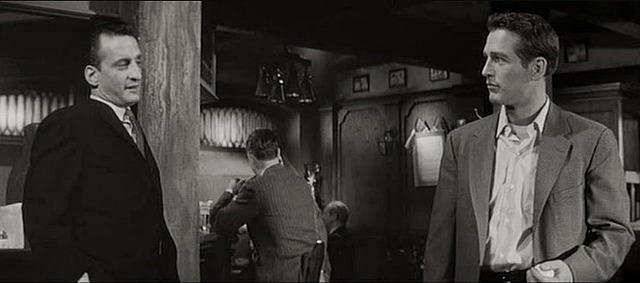Yesterday on Facebook director Rod Lurie posted the following: “Some time ago a director friend of mine, a true giant in my industry, died. Before he passed away, he made a deathbed request of me. He made me promise not to work with a specific actor, so filled of rage was he at the hell this particular thespian put him through. In that moment, which was very sad and heartfelt, I agreed.
“That actor has now been brought to me as a perfect choice for one of my films, and he may well be. [But] I think I have to keep my promise, right?”

George C. Scott as the cynical Bert, Paul Newman as the gifted Eddie Felson in Robert Rossen’s The Hustler.
I replied as follows: “Absolutely not — do what’s best for your film at all times, to your last dying breath. If the director you made your promise to was still with us, I would say ‘of course, keep your word.’ But he’s with the angels now, and you’re here and trying to make the best film possible. That’s all that matters. You kept your word to the departed director before he died, right? You did the right thing then. Now move on and make the best film that you can, and if you feel that casting the Devil himself will help you achieve that goal, then do that.”
I was also thinking that the dying director had a strange attitude about this allegedly awful actor and especially about “water under the bridge” in general. Who on his deathbed is thinking about trying to arrange that some actor, who must have had some value and some understanding of what it takes to socially survive in this industry, never works with a friend or vice versa? What kind of dying person cares about stuff like this?
Paul Schrader joined the thread and said something along the lines of “fools make promises but artists make art,” and that’s all that Lurie should care about — the movie, not the promise.
Some guy said that Lurie has to keep his word or he’ll have a hard time looking in the bathroom mirror for the rest of his life. To which I replied, “What are you, the local priest? To be a good director you must either be a natural sonuvabitch or learn to be one. That’s what John Ford allegedly said at one time to Nunnally Johnson.”
In The Hustler, George C. Scott‘s Bert said to Paul Newman‘s Eddie Felson, “You gotta be hard, Eddie.” It was a cruel thing to say at the moment, but it’s unfortunately true in the making of art. Art sometimes demands tough choices and bold or even ruthless moves. We all want to be Mr. Nice Guy and a significant artist, but sometimes you have to choose.
Another guy on the thread: “Morally, you can’t wrong the dead any more than you could wrong Hamlet, both being unable to feel or in any way be affected by your betrayal. This is to say nothing of the fact that your promise, like all promises requested or demanded by the dying, was hardly freely given; it was coerced. Who can refuse a dying request, even a ridiculous, selfish or dangerous one? If you must keep obligations to the dead, then ethically you are bound to do so only AFTER you’ve kept your promises to the living, including yourself. If you promised to make the best film possible, you must do so while YOU live.”
Lurie announced this morning that he had decided to keep his word to his departed director friend.
“Too bad,” I replied. “You’re the one who said that casting the allegedly asshole-ian actor might be a perfect choice, but now you’ve decided to place personal emotional stuff over professional, potentially-art-making stuff. In other words, you’re not a killer, not hardcore. Billy Wilder would not have been so encumbered.”
A woman named Leana Lewis said that “keeping one’s word is as much professional as it is personal. If only all people could keep their word on a professional level.”
My reply: “I totally agree except when the guy whom I promised something to has died. After that all bets are off. As Thomas Becket says in Jean Anouilh‘s play, ‘Honor is a concern of the living. One can’t be concerned about it [after] one is dead.”
Way up in San Francisco, author, critic and film scholar Joe McBride said, “You should make a movie about this.”
